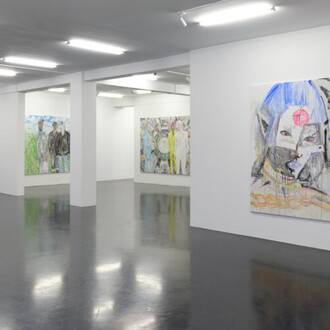Every modern notion of art takes for granted that each individual's creative achievement is unique. As early as the Middle Ages, the artifex was regarded as an eminent artist personality, whose knowledge and capabilities enabled him to be innovative. Thus, what could be more obvious than to reflect upon the notion of the individual via the medium of art? | Our very own collection affords an opportunity for this with the late medieval group of the Four Crowned Martyrs. The spectacular result of a 7-year restoration reveals their preserved original state as brilliant evidence of an individuation rich in details that is closely connected to the portraiture developing from the mid-14th century onwards.
The physiognomies, gestures and facial expressions, hairstyles, dress fashions and accessories make statements about their habits, class and social rank, which seem fundamental to us. The question concerning the individual (Latin, meaning "indivisible/ but of one thing") is of utmost relevance today. We are currently experiencing in a shocking manner how the subject's identification with money and power produces ever-increasing social ills, how violence and corruption destroy the cohesion of societies, how basic values – human rights, the rule of law and tolerance – are questioned and restricted. Terrorist violence specifically targets the freedom of the individual and makes the masses receptive to populist strategies, political demagogy and religious fanaticism. | The exhibition title refers to a group of Chris Newman's early works that has been part of our collection since 1996. Instead of relying upon acquired professionalism, he trusts his individually developed skills and declares straightforward subjectivity to be the most objective form of knowledge.
Like in a "no-time state", beyond the news of the day, the exhibition probes into the artistically formulated aspects of the individual and reminds us that the humanistic character of the individual as a moral subject is inconceivable without the history of Christianity. For it brought about the decisive change in perspective vis-a-vis Antiquity, when the will of the gods determined the fate of the individual. According to Christian understanding, the view of God ultimately takes place through the individual. Hence follows the equality of all humans beyond all constitutional or sociological conditions. With the possibility for atonement and forgiveness as well as the belief in the Resurrection, valid categories for actions came about in the sense of acknowledging one's own personal responsibility. | So what characterizes the individual, what determines his or her actions? Is the outward appearance decisive, for example clothing or jewelry; is it the things, the automobile, the ring tone of the cell phone? What significance do culture and language, native country and housing, actual existential conditions and social contexts bear? May the subject be regarded as an autonomous and unified being at all, or would it be better to speak of an instance that must be construed and revised time and again by each individual? In this respect, how essential is the amount of reason and will, education and faith, experience and memories? What does an attitude imply that advocates the free space of the individual within a solidaric society and, in doing so, opens up prospects for the future development of Europe? | This exhibition, based on our own holdings, has been expanded in the form of a great loan by the High Cathedral Church and, in addition, by two rooms dedicated to artists, where Chris Newman and Martin Assig present their art. We are devoting a separate exhibition to Kurt Benning's "opus magnum", the Burgtreswitzmensch (Treswitzcastleman), created over a period of forty years. Here, in exemplary fashion, and approaching his subject in a circular motion of space and time, he probes into a person's interior and exterior worlds.
Exhibited Artists: Anonymus, Martin Assig, Stephan Baumkötter, Krimhild Becker, Kurt Benning, Anna und Bernhard Blume, Ramón Puig Cuyàs, Beate Eismann, Jeremias Geisselbrunn, Caspar Bernhard Hardy, Bethan Huws, Svenja John, Mirjam Hiller, Franz Ittenbach, Hilde Janich, Hans Josephsohn, Michael Kalmbach, Jannis Kounellis, Konrad Kuyn, Eugène Leroy, Stefan Lochner, Carla Messmann, Chris Newman, Heinrich Parler, Francesco Pavan, Sano di Pietro, Gerd Rothmann, Norbert Schwontkowski, Michael von Savoyen, Richard Serra, Stefan Wewerka, Josef Wolf, Annamaria Zanella
















